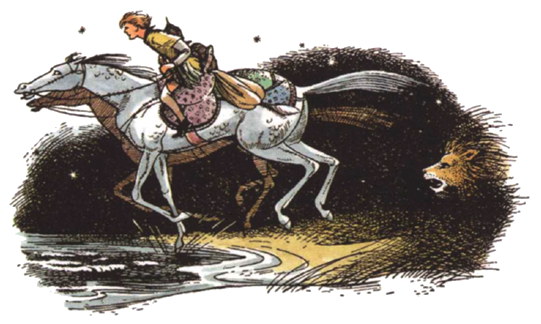Why You Should Read 'The Horse and His Boy'
“One of the drawbacks about adventures is that when you come to the most beautiful places you are often too anxious and worried to appreciate them.”
The third part in C.S. Lewis’ Chronicles of Narnia series of often regarded with some apathy — at least relative to some of the more acclaimed Narnia stories — and I certainly understand why. My early, first impression with The Horse and His Boy was that it spent far too much time meandering through a seemingly linear (and therefore lack-luster) side-story. Of course there were kernels of wisdom strewn throughout the telling of the tale. One should naturally expect this from a C.S. Lewis story. But wisdom alone did not seem enough to carry the story forward, which began in The Lion, The Witch and The Wardrobe (or The Magician's Nephew if you wish to speak chronologically).
But then came the pay-off.
Like the poem Footprints by Margaret Fishback Powers, The Horse and His Boy paints a strong allegory of how Christ walks with us in our struggles, and how all things work together for good for those who love the Lord; for those who are called according to His purpose. (see Romans 8:28)
Running from Aslan
A friend of mine had recently suffered a concussion (or at least some sort of head injury) which forced him to seek medical attention. However, his time at the hospital quickly revealed that he also had cancer in his brain. Because the concussion happened when it did, the doctors caught the cancer early and were able to book an operation to save my friend’s life. I can only imagine how grateful his wife and children are for that head injury!
And so it is with us. Bad things happen to good people. God’s word is very honest about this. But somehow, we are promised that all things work together for good for those who love the Lord; for those who are called according to His purpose. Even the death of the saints is seen as precious in the eyes of the Lord (see Psalm 116:15) because God has the perspective that is outside time and space. He sees us in the light of eternity.
The Horse and His Boy masterfully reminds us of this foundational truth.
“I was the lion." And as Shasta gasped with open mouth and said nothing the Voice continued. "I was the lion who forced you to join with Avaris. I was the cat who comforted you among the houses of the dead. I was the lion who drove the jackals from you while you slept. I was the lion who gave the Horses new strength of fear for the last mile so that you should reach King Lune in time. And I was the lion you do not remember who pushed the boat in which you lay, a child near death, so that it came to shore where a man sat, wakeful at midnight, to receive you.”
Talking Animals and Human Beasts
On the topic of talking animals, there is a noteworthy scene in Chapter 9 of Prince Caspian (which was written before The Horse and His Boy despite being its chronological sequel) where the children lament the killing of a dumb beast — a wild and hungry bear to be more precise. Lucy is slow to nock an arrow to her bowstring for fear that perhaps it may be one of Narnia’s talking animals, who can be reasoned with. Their dwarf companion is not so reserved however, quickly felling the beast before it can inflict carnage on them. An interesting thought is presented here by Lucy, one that I think sheds light on The Horse and His Boy.
“Such a horrible idea has come into my head, Su.”
“What’s that?”
“Wouldn’t it be dreadful if some day in our own world, at home, men started going wild inside, like the animals here, and still looked like men, so that you’d never know which were which?”
The conversation is quickly dismissed, but it gives the reader something to ponder about our world. Have we not experienced a growing wickedness in the hearts of men in our godless times? Carrying this thought back to The Horse and His Boy, I believe this is Lewis’ commentary on Aslan’s enchantment of the Narnia. In the same way that the soul animates the body, and those who are in Christ are indwelt with the Holy Spirit, we human’s can be said to be enchanted by our God; even those outside the faith experience degrees of common grace, as His invisible qualities are seen all around us and are teaching us.
But what happens when a society outright rejects Him and suppresses plainly observable truths? Would not that citizenry slip into spiritual darkness, and thereby willful blindness? So, it seems, did it happen to those brutes who were outside of Aslan’s enchanted country.
The Calormene Empire was a dessert land which stood in obstinance to Aslan’s enchanted kingdom to the north. And as such, their beasts were dumb to language and their people were cruel. This symbolism is seemingly fulfilled by Aslan’s justice, which renders their wicked tyrant a braying donkey.
Have you read A Horse and His Boy? Let me know what you thought in the comments.






A really overlooked and undervalued book indeed. I admittedly initially put it down more times than I picked it up, but when you give it a chance and read it all the way through, it proves itself to be well worth the time and arguably one of the best books of the series.
I don't remember The Horse and His Boy as clearly as some of the other stories, but I remember it being important in the sequence. I "appreciated" it if nothing else. It is my mother-in-law's favorite of the series. I really enjoyed your article!